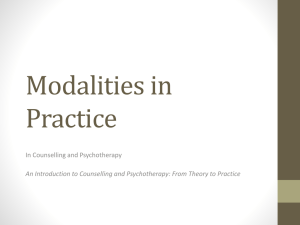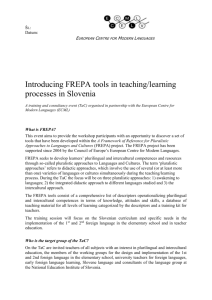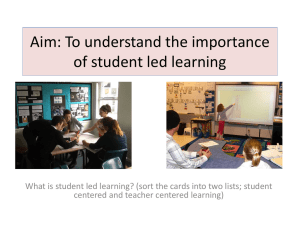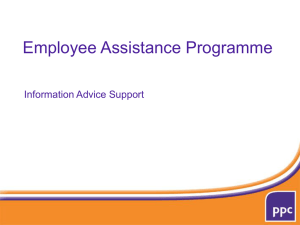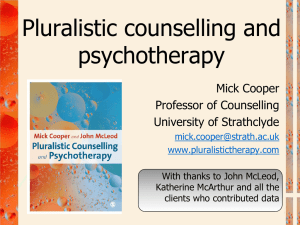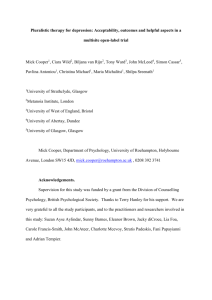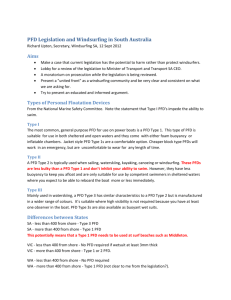Pluralistic therapy for depression
advertisement
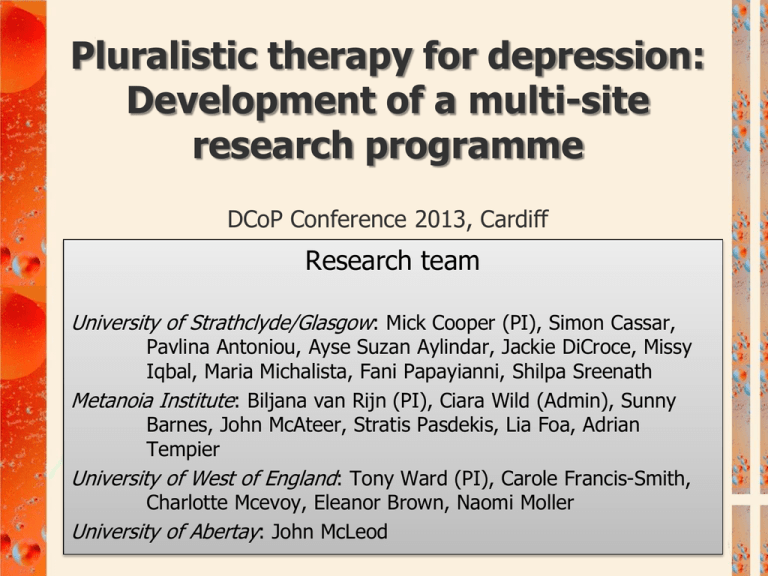
Pluralistic therapy for depression: Development of a multi-site research programme DCoP Conference 2013, Cardiff Research team University of Strathclyde/Glasgow: Mick Cooper (PI), Simon Cassar, Pavlina Antoniou, Ayse Suzan Aylindar, Jackie DiCroce, Missy Iqbal, Maria Michalista, Fani Papayianni, Shilpa Sreenath Metanoia Institute: Biljana van Rijn (PI), Ciara Wild (Admin), Sunny Barnes, John McAteer, Stratis Pasdekis, Lia Foa, Adrian Tempier University of West of England: Tony Ward (PI), Carole Francis-Smith, Charlotte Mcevoy, Eleanor Brown, Naomi Moller University of Abertay: John McLeod Aims • Describe the development of a multisite study for evaluating the outcomes of a counselling psychology intervention: pluralistic therapy for depression • Provide preliminary data on participants and outcomes Pluralistic therapy • • • • Strives to transcend ‘schoolism’ in psychological therapies Collaborative-integrative practice: draws on range of approaches and methods to tailor therapy to the individual client Emphasis on meta-therapeutic communication: client-therapist dialogue and negotiation to identify clients’ goals, and methods/tasks to achieve them Aligned to counselling psychology values and developments Development of study • 2011 – Tony Ward brought together PIs to test an alternative to NHS standardised ‘evidence-based’ practices • Need for preliminary pilot data • 2012 – application to BPS DCoP for funding for supervision costs • Sept. 2012 – pilot study commenced • Data collection completed by Dec. 2013 Structural organisation • Multi-site study across three counselling psychology teams: UWE, Metanoia, Strathclyde/Glasgow • Principal Investigators (PIs) at each site • 3-4 practitioners per site (CPsyc student placements/staff) • Additional students collecting/using data for doctoral research projects • Data administrator based at Metanoia • Supervisor based at University of Abertay • Monthly online team meetings across sites • Documentation stored/shared via Dropbox Recruitment • Participants invited into study through: local publicity, student services, established clinics • Detailed information sheets provided • Invited for assessment: key inclusion criteria: PHQ-9 ≥ 10 (moderate depression) • Offered up to 24 sessions ‘Manualising’ pluralistic therapy • Brief manual of practice drafted, with self-rated adherence scale: 1. Facilitating client-therapist collaboration through goal/task/method identification and negotiation 2. Shared understanding of clients’ goals 3. Clear about tasks being worked on 4. Effective in using appropriate methods • ‘Expert’ one-to-one supervision Tailoring the therapeutic intervention • Psychologists trained in a range of relational, integrative and structured principles and practices: including person-centred, CBT, psychodynamic • Assessment identifies clients’ personal goals for therapy Goal Assessment Form Tailoring the therapeutic intervention • Meta-therapeutic dialogue with client on how they might achieve these goals, and preferred style of therapy • Use of Therapy Personalisation Form – Assessment Tailoring the therapeutic intervention • Therapists encouraged to consistently dialogue with clients re preferred goals and methods, and respond in flexible ways • Weekly Session Rating Scale (SRS) and outcome measures • Structured reviews at sessions 5 and 10, with Therapy Personalisation Form, review of goals, and meta-therapeutic dialogue Outcome and process measures • • • • PHQ-9: Depression (primary outcome) GAD-7: Anxiety Goal Assessment Form: Personal goals Helpful Aspects of Therapy Form: Clients’ experiences of sessions • Change Interview: Clients’ experiences of therapeutic and research process • SRS/Working Alliance Inventory/Relational Depth Inventory/Alliance Negotiation Scale: therapeutic relationship Preliminary Data (as of th 24 June 2013) Participant flow chart Attended assessment interview: n = 49 Did not meet inclusion criteria (PHQ-9 < 10): n = 4, 8.2% Assessed: n = 45 Dropped out/unplanned ending: n = 11, 24.4% After assessment: n = 3, 6.7% During therapy, n = 8, 17.8% Planned ending (by 24/6/2013): n = 4, 8.9% In therapy: n = 30, 66.7% Participants • • • • • 75% female, 25% male Mean age = 30.6 (range 18-58) Approx 25% BME, 75% white European 10% disabled Mean PHQ-9 at assessment: 18.38 (moderately severe depression, range 9 – 25) • Mean GAD-7 at assessment: 15.48 (range 5 – 21) Qualitative feedback Initial change interviews (n = 3) suggest that clients appreciate PfD therapists’ flexibility and their willingness to listen to the clients’ wants and preferences, and tailor accordingly Discussion Challenges • Establishing, and maintaining, consistency of protocols across sites • Need for independent auditing of pluralistic practice • Limited availability of funding • Managing and processing extensive data Implications for counselling psychology research • Coordinated, multi-site projects afford opportunity to develop, and rigorously test, counselling psychology interventions • Significantly enhances n/power • Attainable with limited funding • Provides basis for larger funding applications • Extensive range of potential outputs Planned analyses/papers ANALYSIS Outcomes of PfD Feasibilitiy of PfD protocols Helpful aspects of PfD Helpful aspects of PfD sessions Matching between T and C ratings Case studies Helpfulness of pluralistic measures Pluralistic auditing tool Therapy Personalisation Form Analysis of session transcripts Client goals Analysis of SRS DATA PHQs, GADs, GAF Recruitment and retention Change interviews HATs HATs All Change interviews Therapist report forms TPF/TPF-A Session recordings Goal Assessment Forms SRS forms Students: high quality supervised placements Synergies Counselling psychology community: developing and promoting interventions Students: conducting and publishing research Academics: conducting and publishing research; research funding Requirements • Focused research question • Clear organisational structure, and communication, across sites • Clear organisational structure, and communication, within sites • Clear and explicit protocols for research, practice and analysis Pluralistic therapy for depression: Development of a multi-site research programme DCoP Conference 2013, Cardiff Thank you Mick.cooper@strath.ac.uk www.pluralistictherapy.com
